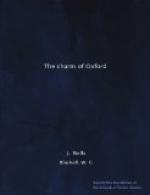“Thames, the best loved of all old Ocean’s sons,
Of his old sire, to his embraces runs . . .
Though deep, yet clear, through gentle yet not dull,
Strong without rage, without o’erflowing full.”
SIR J. DENHAM.
[Plate XXVI. Iffley : The Old Mill]
The subject of Plate XXVI is no longer in existence; it was burned to the ground some years ago, and has never been rebuilt—for steam has rendered unprofitable the old-fashioned water mills such as it was. Yet the very fact that Iffley Mill is no more perhaps renders it the more appropriate subject for a series of Oxford pictures. It claims a place among them, not for its beauty, picturesque though it was, but as a symbol of the open-air pursuits of Oxford, which play so large a part in the lives of her sons. And as those pursuits are so diverse, and cannot all be directly pictured, it is fitting that they should be represented by a picture which is a symbol of them all, by a picture of something no longer existing, not introduced for itself, but suggesting whole fields of varied activity, different and yet all akin.
This may be fanciful, but the part played by open-air sports in the life of Oxford is a great reality. Yet, in their present organized form, they are a feature of quite, modern times. Fifty years ago, football as a college sport in Oxford was only beginning; the men are still living, and not octogenarians, who introduced their “school games”—“Rugby,” “Eton Wall game,” etc.—at Oxford. Golf was left to Scotchmen, hockey to small boys, La Crosse had not yet come from beyond the Atlantic. Cricket and rowing were the only organized games, and even in these the inter-University contests are comparative novelties; the first boat race against Cambridge was rowed in 1829, and it has only been an annual fixture since 1856.
Several results followed from this. In the first place, the very sense of the word “sportsman” was different. Now it means a man who can play well some, one at least, of the games that all men play; then, it had its old meaning of a man who could shoot, or ride, or fish, or do all these.
Again, as cricket is always a game for the few, and as the rowing authorities, by the time the summer term begins, had selected their chosen followers and left the rest of the world free, there was far more walking, and consequently more knowledge of the country round the city, than is the rule now. The long rambles which play so prominent a part in Oxford biographies, such as Stanley’s Life of Arnold, were still the fashion, while of those who could afford to ride, certainly many more availed themselves of the privilege than do now.




